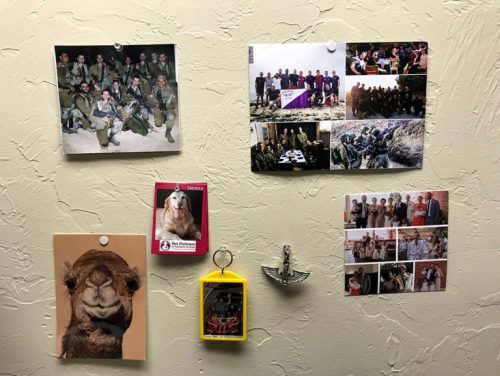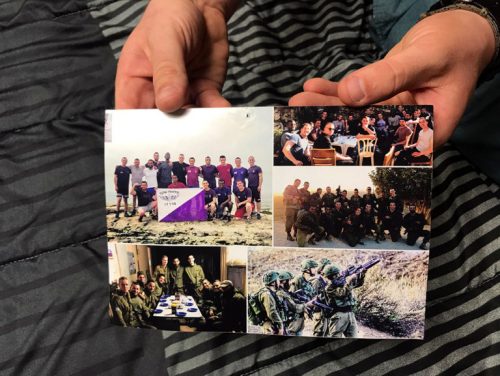By Leia Linn/Arizona Sonora News
Yoni Wulf is like most college freshmen. He crams for exams, goes out for food, and even FaceTimes home every now and then, mostly to talk to his dog. But what most people can’t tell is that Wulf has a very unique history; he went from the Israeli desert to the Sonoran in a matter of 3 years.
“I was born in Berkeley, California, in 1996. March 5th to be exact,” Wulf says. That makes Wulf almost 24 years old.
His last name might be Wulf but Yoni is more like a teddy bear. He is a big guy, not at all scary, especially when he flashes his innocent smile and cocks his head back. He dresses in typical boy clothes and Vans like a California skater boy and rocks a star of David necklace to show his pride for his religion. Yet before living a normal freshman life, he took a lesser known path. Wulf moved to Israel, a country that he is not a citizen of, to serve in the Israeli Defense Force, or IDF.
“I always knew that I wanted to do something for Israel, that was very important to me and very critical that it be part of my life in some way. I didn’t initially think about the army. Or what I was going to do. I just knew that it was a very important part of my upbringing and my life,” Wulf says.
Wulf was raised in a modern Orthodox household where he followed most of the customs of Judaism such as attending weekly Shabbat services and dinners, observing Jewish holidays, and taking family trips to Israel. Wulf’s late grandmother owned a condo in Jerusalem so the family would make visits quite often.
“So a big part of my Judaism growing up was Israel. It was always kind of described as obviously the Holy land, but more so a place where Jews can be themselves and practice their Judaism and never have to deal with any kind of oppression or discrimination. That was always a very, very big concept in my family, that Israel is hugely important to the Jewish people and hugely important to us,” Wulf says.
Israel is one of the only nations in the world that recruits soldiers from every corner of the globe and from all walks of life. As a member of their army, Wulf met fellow soldiers from Canada, Brazil, Norway, India, Russia—and from Israel, of course. Every citizen, except highly religious ones, have to serve in the army for 2-to-3 years.
“The military is a huge part of Israeli society. And because there is a draft, you see soldiers everywhere. I mean just walking down the street you see a soldier or a group of soldiers passing by. So army life is huge in Israel, everybody is in the army,” Wulf explains.
Once Wulf finally got to Israel, he had to do special training designed for non-Israeli soldiers before he could start boot camp. This special training included a grand tour of Israel to see all the historic and natural sights as well as taking Hebrew classes. The two main languages in Israel are Hebrew and Arabic but most people, especially in the larger cities, speak English. Once Wulf finished, he met his basic training unit.
“Basic training was difficult, but it was also really fun in some sense. I mean, the people that were there were just guys from everywhere, every walk of life. Everybody was the same, so you never knew who they were until you actually interacted with them,” Wulf says. “So the rich kids, the poor kids that the, the black kids from, from Ethiopia, which is like a huge population in Israel, uh, the foreigners like myself all mixed together and we were all in the same uniform, so nobody knew anything. Nobody was better than anybody else.”
“You just have this group of guys with the same goal,” Wulf says. “I met some people that I’m going to stay in contact with for the rest of my life in those first weeks. We just went through all the hard times, all of the marches together.”
The marches were one of the most difficult trainings according to Wulf. They consisted of a walking pace, almost jogging, and if one person fell out of line the whole group had to pay the price, meaning extra running, pushups, or other forms of “discipline.”
“You have a huge amount of weight on you and you’re going and don’t stop. Through those hard times people faint, people say that they can do it, and then the whole team has to stop and you just learn that you’re part of this bigger team. If you look over to your left and you look over to your right, there are two people having just as hard of a time as you are. I think that’s one of the amazing things I learned in the army is persistence,” Wulf says.

At this point, Wulf had been in Israel for a while but was still having to be persistent himself, adjusting to life in a foreign country. He missed the convenience of America and the big name stores that carried everything and are accessible via Google Maps.
Within a few months, Wulf was done with basic training and ready to begin his service as a combat soldier. Many positions in the military are non-combat since it takes so many people to support the army. Other jobs include desk workers, supply chain people, transportation workers, and medical positions. Wulf was placed as a soldier who guarded one of Israel’s most high intensity borders: Gaza.
“Once I got to Gaza, I realized that it was a routine. I always thought of it as my army service. When I would go home and people would see me walking down the street with my gun on me it just kinda felt like everybody was so appreciative. You would go to restaurants and they would fill up your plate extra because you’re a soldier and if they see your combat soldier and they would sometimes give you meals for free,” Wulf says.
“Living in Israel was crazy. I mean it’s a very different culture. It’s a lot more tough. Everybody has a thick skin and it’s a little bit more aggressive. So that was definitely a big culture shock,” Wulf says.
Upon leaving the army it was only natural that Wulf became a different person than he was going into it. Not only did he learn more about himself, but he learned more about his limits and pushing himself to the max.
“You just become kind of selfless and you just go and your body tells you to stop and your muscles are screaming at you and you just can’t stop. That’s probably the most important thing that I learned in the army. The basic training was a lot of hard work, but a lot of hard work with your friends and making those amazing connections,” Wulf says.
Once his time in the Army came to a close, Wulf decided it was time to come back to the United States and start his college career. He compared his last day leaving the army base to the end of Fast and Furious where the two cars go onto the two roads.

“When I left the base for the last time, it was just odd. It was just like any other day that I was leaving the base to go back home for the weekend or whatever, but it was just like, wow, I’m never going to be back here and I’m only getting to see these people if I take another trip back to Israel,” Wulf says.
But for now he is currently on a new mission—college. Wulf decided on the University of Arizona and now lives on campus in Graham-Greenlee, a brown brick dorm that can be found right in the heart of campus on Highland Avenue. In the tiny closet, I mean dorm room, he was lucky to be paired with a roommate who is around his age; who is a little bit more focused compared to their neighbors who party and play music quite often, according to Wulf.
Even though Wulf might be more ‘mature’ from his military training than the average freshman, he still partakes in traditional freshman activities such as studying at the library, grabbing food with friends, binging on coffee, pulling all-nighters to cram and being too tired to get out of bed.
“So my daily life on campus involves getting up probably too late. I think army had an effect on me where I now never want to get up very early at all. I just go about my day. I feel like from day to day my life is very similar to most other students. I just go to classes, come back, do my homework, and sleep as much as I can. That’s pretty much it,” Wulf says.
Aside from just having the right feeling about campus, he liked the engineering department and the fact that they offered not only computer science and engineering, but a combination of the two, which is what he wanted—computer engineering. He also liked the Salt Center, a center on campus that provides services to students with learning disabilities.
“So I’d always been interested in computers and building things and taking things apart. As I grew older, technology kind of evolved and coding and engineering and all those kinds of disciplines started just popping up out of nowhere. I just really enjoyed the idea of building my own things from solving those little problems or figuring out a way to physically fix something or repair something or make something better. Engineering seemed like a relevant course,” Wulf says.
Currently, Wulf is finishing up his first semester at UA and hopes to return to Israel in the future to visit his friends.
Credits for audio story: Music from www.bensound.com and www.freemusicarchive.org
